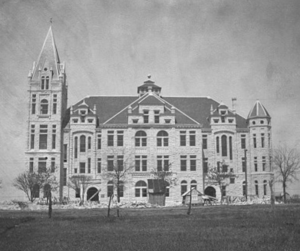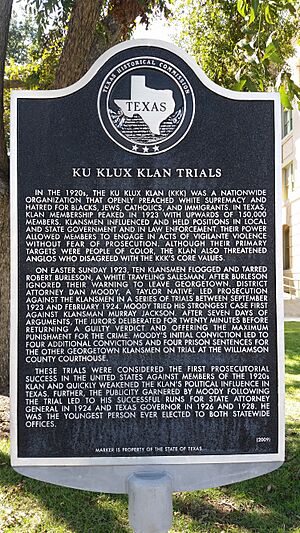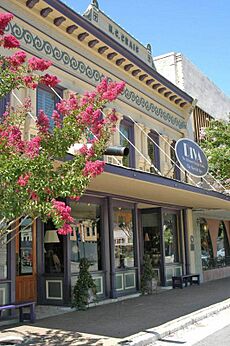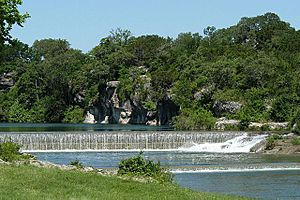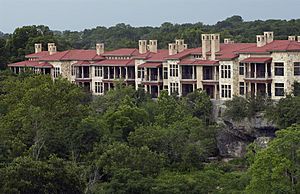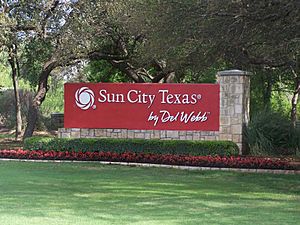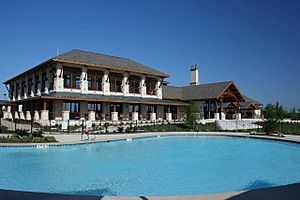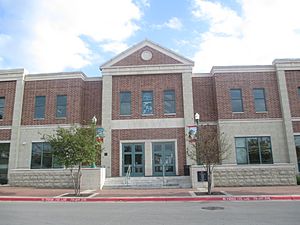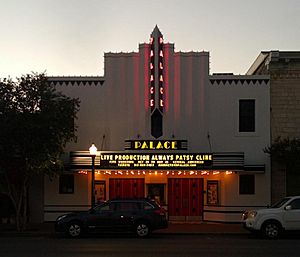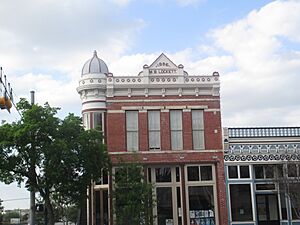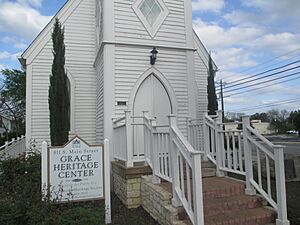Georgetown, Texas facts for kids
Quick facts for kids
Georgetown, Texas
|
|
|---|---|
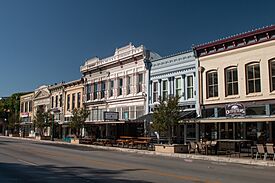
Downtown Georgetown
|
|
| Nickname(s):
Red Poppy Capital of Texas, G-Town, GTX, Takachue Pouetsu (Land of Good Water)
|
|
| Motto(s):
"Sincerely Yours"
|
|

Location of Georgetown, Texas
|
|
| Country | United States |
| State | Texas |
| County | Williamson |
| Founded | 1848 |
| Incorporated | 1866 |
| Named for | George Washington Glasscock |
| Government | |
| • Type | Council-Manager |
| Area | |
| • Total | 60.452 sq mi (156.570 km2) |
| • Land | 58.146 sq mi (150.597 km2) |
| • Water | 2.306 sq mi (5.971 km2) |
| Elevation | 755 ft (230 m) |
| Population
(2020)
|
|
| • Total | 67,176 |
| • Estimate
(2023)
|
96,312 |
| • Rank | US: 352nd TX: 44th |
| • Density | 1,656.0/sq mi (639.5/km2) |
| Demonym(s) | Townie |
| Time zone | UTC–6 (Central (CST)) |
| • Summer (DST) | UTC–5 (CDT) |
| ZIP Codes |
78626, 78627, 78628, 78633
|
| Area code(s) | 512 and 737 |
| FIPS code | 48-29336 |
| GNIS feature ID | 1357960 |
| Sales tax | 8.25% |
Georgetown is a city in Texas, located north of Austin. It is the main city of Williamson County. In 2020, about 67,000 people lived here, and by 2023, the number grew to an estimated 96,000.
Georgetown is famous for its beautiful Victorian buildings, both homes and businesses. In 1976, the city started protecting its historic downtown. A year later, the Williamson County Courthouse area, with 46 important buildings, was added to the National Register of Historic Places.
Southwestern University, the oldest university in Texas, was founded in Georgetown in 1875. The city is also known as the "Red Poppy" Capital of Texas because of the many red poppy wildflowers that grow there. Every April, Georgetown hosts a Red Poppy Festival, which brings in thousands of visitors.
Contents
History of Georgetown
Early Days and Growth
Georgetown was named after George Washington Glasscock, who gave the land for the new town. Early settlers from America and Sweden came to the area because of its many trees, clear water, and affordable, fertile land. Williamson County was created on March 13, 1848. It was named after Robert McAlpin Williamson, a Texas statesman and judge.
For most of the 1800s and early 1900s, Georgetown was a farming community. The Shawnee Trail, a path for moving cattle from Texas to Kansas and Missouri, went through Georgetown. The founding of Southwestern University in 1873 and the building of a railroad in 1878 helped the town grow. The economy was strong, mostly thanks to farming. Cotton was a very important crop from the 1880s to the 1920s. At one point, Williamson County produced the most cotton in Texas.
Georgetown was served by two national railroads, the International-Great Northern Railroad and the Missouri–Kansas–Texas Railroad. These railroads helped transport goods like beef and cotton. Today, the Georgetown Railroad connects the city to other major rail lines.
In 1921, a hurricane caused heavy flooding in Williamson County, including Georgetown. This led to many deaths and a lot of damage. To prevent future floods, the U.S. Army Corps of Engineers built a dam on the San Gabriel River, creating Lake Georgetown in 1979. Both Georgetown and Round Rock use Lake Georgetown for their water supply.
Georgetown continued to grow steadily until about 1960. After that, its growth sped up a lot because of the expansion of nearby Austin. In 2008, Fortune Small Business magazine called Georgetown the second-best city in the U.S. to start a new business. In 2015, Georgetown announced that its city-owned power company would buy all its electricity from wind and solar farms by 2017. This made Georgetown one of the first cities to be 100% powered by green energy.
Important Trials in Georgetown's History
Between 1923 and 1924, District Attorney Dan Moody led important trials against the Ku Klux Klan at the Williamson County Courthouse. These trials led to five convictions against Klan members for attacking a traveling salesman. Historians say these trials were the first successful legal actions against the Klan in the 1920s in the United States. They quickly reduced the Klan's power in Texas.
The Burkland-Frisk House: A Historic Move
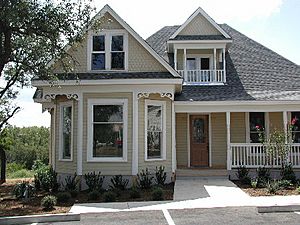
A historic Victorian house from 1908–1910 was found in Round Rock, Texas. In 2006, this house was carefully cut into pieces and moved to Georgetown. It was then restored and now serves as an office. The house is known as the Burkland-Frisk House, named after Leonard Frisk, who built it, and Tony Burkland, a later owner. It stands overlooking the South San Gabriel River.
Preserving History: Downtown Georgetown
In the 1970s, Georgetown's downtown area looked plain. To seem more modern, building owners had covered up some of their old, historic buildings. But community leaders decided to bring back the original look of the city's historic buildings. They worked with a program called Main Street to improve the city's architectural heritage.
Banks in Georgetown offered lower interest loans for restoring the old Victorian buildings. By 1984, 40 buildings had been restored. Because of its successful efforts to preserve its history, Georgetown was named a national Main Street City in 1997.
Today, Georgetown has one of the best-preserved historic downtown areas from before World War I. The beautiful Williamson County Courthouse (built in 1911) is at its center. Georgetown has three areas listed on the National Register of Historic Places:
- Williamson County Courthouse Historic District
- Belford National District
- The University Avenue/Elm Street District
Geography of Georgetown
Georgetown is about 26 miles (42 km) north of downtown Austin. The city covers about 60.45 square miles (156.57 km²). Most of this area is land, with about 2.3 square miles (5.97 km²) covered by water.
The city is on the edge of the Texas Hill Country. East of Interstate 35, the land is flat with rich, black soil. West of Interstate 35, the area has hills and karst-like terrain, which means it has many caves and sinkholes. Inner Space Cavern, a large cave, is a popular tourist spot on the south side of the city.
The North and Middle Forks of the San Gabriel River flow through Georgetown. Along their banks, there are over 30 miles of trails for hiking and biking, plus several parks for everyone to enjoy.
- Major highways
 Interstate 35
Interstate 35 State Highway 29
State Highway 29 State Highway 195
State Highway 195 State Highway 130 (Toll Road)
State Highway 130 (Toll Road)
Endangered Species in Georgetown
Georgetown is home to five endangered species. Two are songbirds protected in the Balcones Canyonlands National Wildlife Refuge. Other endangered species are tiny invertebrates that live in the cave-like cracks found on the west side of Georgetown. These cracks are part of the Karst topography of the area.
In the 1990s, a group of landowners and developers worked to protect these species. They wanted to save enough caves to help the endangered animals survive. Their efforts led to a special permit in 2008. This permit helps protect these species through voluntary land donations, rather than strict rules.
Georgetown's Climate
Georgetown has a humid subtropical climate. This means it has long, hot summers and cooler, mild winters. In July and August, temperatures often reach 100°F (38°C). Even in October, highs can be near 90°F (32°C), but nights become cooler.
Winters in Georgetown are mild, with highs usually in the 50s and 60s°F (10-20°C). Sometimes, temperatures drop near freezing, causing a few ice storms. But it's also possible to have warm days, even in December or January.
Rainfall is fairly even throughout fall, winter, and spring, averaging about 2-3 inches (5-7.5 cm) per month. July and August are the driest months. Georgetown gets more than 225 sunny days each year.
| Climate data for Georgetown Lake, Texas (1991–2020 normals, extremes 1980-present) | |||||||||||||
|---|---|---|---|---|---|---|---|---|---|---|---|---|---|
| Month | Jan | Feb | Mar | Apr | May | Jun | Jul | Aug | Sep | Oct | Nov | Dec | Year |
| Record high °F (°C) | 88 (31) |
98 (37) |
97 (36) |
99 (37) |
102 (39) |
106 (41) |
110 (43) |
109 (43) |
111 (44) |
99 (37) |
93 (34) |
84 (29) |
111 (44) |
| Mean daily maximum °F (°C) | 60.3 (15.7) |
64.6 (18.1) |
71.5 (21.9) |
78.6 (25.9) |
85.4 (29.7) |
92.0 (33.3) |
95.9 (35.5) |
96.8 (36.0) |
90.1 (32.3) |
81.3 (27.4) |
69.8 (21.0) |
61.7 (16.5) |
79.0 (26.1) |
| Daily mean °F (°C) | 48.3 (9.1) |
52.3 (11.3) |
59.4 (15.2) |
66.4 (19.1) |
74.4 (23.6) |
80.7 (27.1) |
84.1 (28.9) |
84.4 (29.1) |
78.3 (25.7) |
69.0 (20.6) |
58.1 (14.5) |
49.9 (9.9) |
67.1 (19.5) |
| Mean daily minimum °F (°C) | 36.2 (2.3) |
40.1 (4.5) |
47.2 (8.4) |
54.2 (12.3) |
63.4 (17.4) |
69.5 (20.8) |
72.2 (22.3) |
72.0 (22.2) |
66.5 (19.2) |
56.8 (13.8) |
46.3 (7.9) |
38.2 (3.4) |
55.2 (12.9) |
| Record low °F (°C) | 6 (−14) |
6 (−14) |
17 (−8) |
31 (−1) |
37 (3) |
46 (8) |
56 (13) |
55 (13) |
34 (1) |
28 (−2) |
23 (−5) |
−2 (−19) |
−2 (−19) |
| Average precipitation inches (mm) | 2.50 (64) |
2.24 (57) |
3.09 (78) |
3.02 (77) |
4.25 (108) |
3.97 (101) |
2.19 (56) |
2.64 (67) |
3.96 (101) |
3.92 (100) |
2.71 (69) |
2.59 (66) |
37.08 (942) |
| Source: NOAA | |||||||||||||
People of Georgetown
| Historical population | |||
|---|---|---|---|
| Census | Pop. | %± | |
| 1870 | 479 | — | |
| 1880 | 1,354 | 182.7% | |
| 1890 | 2,447 | 80.7% | |
| 1900 | 2,790 | 14.0% | |
| 1910 | 2,096 | −24.9% | |
| 1920 | 2,871 | 37.0% | |
| 1930 | 3,583 | 24.8% | |
| 1940 | 3,682 | 2.8% | |
| 1950 | 4,951 | 34.5% | |
| 1960 | 5,218 | 5.4% | |
| 1970 | 6,395 | 22.6% | |
| 1980 | 9,468 | 48.1% | |
| 1990 | 14,842 | 56.8% | |
| 2000 | 28,339 | 90.9% | |
| 2010 | 47,400 | 67.3% | |
| 2020 | 67,176 | 41.7% | |
| 2023 (est.) | 96,312 | 103.2% | |
| U.S. Decennial Census Texas Almanac: 1850-2000 2020 Census |
|||
Georgetown's Population in 2020
| Race | Number | Percentage |
|---|---|---|
| White (NH) | 45,555 | 67.81% |
| Black or African American (NH) | 2,948 | 4.39% |
| Native American or Alaska Native (NH) | 182 | 0.27% |
| Asian (NH) | 1,355 | 2.02% |
| Pacific Islander (NH) | 53 | 0.08% |
| Some Other Race (NH) | 241 | 0.36% |
| Mixed/Multi-Racial (NH) | 2,397 | 3.57% |
| Hispanic or Latino | 14,445 | 21.5% |
| Total | 67,176 | 100.00% |
In 2020, Georgetown had 67,176 people living in 28,845 households. About 73.9% of the population was White, 4.7% African American, and 2.1% Asian. People of Hispanic or Latino background made up 21.5% of the population. About 19.1% of residents were under 18 years old, and 28.5% were 65 or older.
Georgetown's Economy
Top Employers
Georgetown has many important employers. Here are some of the largest ones:
| # | Employer | # of Employees |
|---|---|---|
| 1 | Williamson County Government | 1,582 |
| 2 | Georgetown ISD | 1,550 |
| 3 | City of Georgetown | 670 |
| 4 | St. David's Hospital | 512 |
| 5 | Airborn, Inc. | 482 |
| 6 | Southwestern University | 450 |
| 7 | Wesleyan Homes | 340 |
| 8 | HE Butt Grocery | 283 |
| 9 | Caring Home Health | 263 |
| 10 | Sun City (Del Webb) | 170 |
| — | Total employers | 6,302 |
Interstate 35 and Georgetown's Growth
The location of Interstate 35 was very important for Georgetown's economic growth. At first, it was not certain if the highway would go through Georgetown. But leaders in Georgetown and Round Rock worked hard to have the road built along the Balcones Escarpment, which became I-35. This helped Georgetown grow and connect to other areas.
Sun City Texas: A Retirement Community
Another big part of Georgetown's economy is Sun City Texas. This large community for people aged 55 and older opened in 1995. It was the first Sun City location in Texas. Today, it is home to about 15,700 people. Sun City Texas has greatly boosted Georgetown's economy and community.
Sun City Texas is a large community covering about 5,300 acres (21 km²). Most homes are single-family houses, but there are also duplexes. Residents can drive golf carts on the streets, and many places have special parking for them.
Georgetown is considered one of the best places to retire in the U.S. This is because of its warm climate, its location near both the countryside and Austin, good medical care, and its growing number of retirees. Many other communities for active adults are also in Georgetown, offering different levels of care.
Education in Georgetown
The city of Georgetown is served by the Georgetown Independent School District. Some parts are also served by the Leander Independent School District. Georgetown High School is a well-known school in the community. In 2008, Georgetown opened a second high school, East View High.
Georgetown is also home to Southwestern University. This private, four-year college was founded in 1875 and is the oldest university in Texas. Southwestern offers many different bachelor's degrees in arts, sciences, fine arts, and music.
Places to Visit in Georgetown
- Williamson County Courthouse
- Williamson County Art Guild
- Berry Springs Park
- Sun City Texas
- Blue Hole Park
- San Gabriel Park
- Georgetown Firefighters Museum
- Inner Space Cavern
- Lake Georgetown
- Georgetown Municipal Airport
- The Levy House
- Palace Theatre
- Georgetown Art Center
- Garey Park
- Booty's Park
Notable People from Georgetown
- Brian Anderson, a sports announcer for Turner Sports and the Milwaukee Brewers.
- Mason Crosby, an NFL kicker for the Green Bay Packers, Super Bowl XLV champion.
- Matt Dominguez, a Grey Cup winner and All-Star wide receiver in the Canadian Football League.
- Thomas Fletcher, an NFL Long Snapper for the Carolina Panthers.
- Conan Gray, a singer-songwriter and internet personality.
- Ryan Ludwick, a former Major League Baseball outfielder.
- Nolan Ryan, a famous former Major League Baseball player.
- Granger Smith, a country music singer-songwriter.
- James Willbanks, a military historian.
- Paul Wall, a rapper.
See also
 In Spanish: Georgetown (Texas) para niños
In Spanish: Georgetown (Texas) para niños


